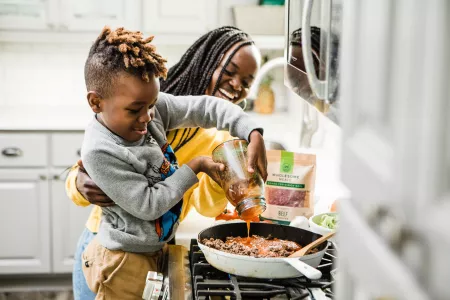What to do when you become a stepparent
“The majority of stepparents, myself included, will tell you that they thought it would be so much easier to be a stepparent than it actually was.”
We enter into the role naively thinking ‘How hard can it be?’. We love our partners and think the rest will follow. Sadly the reality is that it isn’t easy and we start doubting our ability to cope with the challenges of stepparenting.
So how can you avoid the pitfalls and build a happy blended family together?
Here are a few things that you should consider when you meet a new partner and one, or both of you, already have children.
1. Take time to get to know one another
It’s only natural to want to progress things quickly but it’s important to take your time once children are involved. All blended families have experienced some form of loss, either through a divorce, separation or even the death of a partner/parent.
Everyone grieves differently so while you and your partner are ready to move on, the children, other biological partners, grandparents or even friends might be finding it difficult to adjust. It generally takes several years for a blended family to integrate.
Take time to get to know everyone, and for them to get to know you. Try and spend time together having fun and making memories. When we’re happy we’re more likely to be ourselves and can relax – just have fun together!
2. Work out what role you want in the family
This might sound obvious but in reality, the role of stepmum or stepdad is very vague. You could be a ‘replacement’ parent at one end of the scale, especially if their bio parent is no longer around – or you could be more of a friend to your partner’s children, particularly if they are older and you only see them from time to time.
The most important thing is to agree on your role with your partner and check you have the same expectations. There are no fixed rules, it’s just important you and your partner keep talking and work out what you’re both comfortable with and what works in your family.
3. Take your lead from the children
It can be hard but it’s important to try and take things at a pace they’re happy with. Children want to be loyal to their biological parents so it’s often hard for them to work out how to deal with stepparents. Try and let them know that they can choose how to refer to you. Children like to blend in so they may refer to stepparents as mum or dad when they’re in public but use their first names in private. Just let them know that just because they call you mum or dad doesn’t mean that you are in any way replacing their biological mum or dad.
4. Put yourself in your stepchildren’s shoes
If it’s still relatively early days in your relationship and you’re still getting to know one another, the last thing they want to do is feel that they’re abandoning their mum or dad by ‘replacing’ them. Just reassure them that it’s their choice and to do what they feel comfortable doing.
5. The term ‘step’ is only a name
Try not to worry about the label. Most blended families go through a period where they just want to be ‘normal’ and not stand out. It’s important to remember that there is no such thing as a ‘normal’ family. Stepfamilies are the fastest-growing family type in the UK. That ‘normal’ family you’re envying is probably a stepfamily!
Sometimes searching for a name, whether it's step or blended, is really just a way of trying to come to terms with the changes in your family. Try and embrace who you are and learn to get to know everyone. Make time with each of the children and try and find a shared interest, whether it’s going for a bike ride, going shopping or playing board games.
6. Learning to co-parent is tough
Learning to co-parent your children with an ex-partner is often one of the hardest things we have to do as a parent and it’s even harder to cope when you’re the stepparent and have to potentially deal with a ‘difficult’ ex. Try not to set yourself unrealistic expectations. Whilst it would be ideal if we could all get on with our ex-partner and co-parent our children together there is a reason we are no longer with them. Children are not harmed by divorce or separation but by the ongoing conflict. So do all you can to limit interaction.
Keep to a rigid childcare arrangement and avoid deviating from it unless you really have no choice. The longer you can keep to a routine the better for you and your children. Arrange holidays or plan for special events (birthdays, weddings etc) in advance so no one is disappointed. Things tend to calm down over time so you can hopefully reach a better relationship as you both move on with your lives.
7. Setting boundaries for children in a blended family is also a minefield
The general advice is for the biological parent to take charge of discipline in the early days. Children are going to resist listening to a stepparent at the beginning of a relationship and will always defer to their biological parents. However as time moves on, particularly once you live together (even some of the time), it’s important that as a stepparent you feel you have a voice and are listened to! It's best to have a few clear house ‘rules’ or ‘boundaries’. This can be as simple as taking shoes off, putting plates in a dishwasher or maybe tidying their room. It’s important that the stepparent feels they have some authority in their own home and, importantly, have the support of their partner. The children need to feel that you are both in charge and will listen to both of you.
8. There is a lot of support available
Finally, it’s worth me saying that you only tend to hear about the issues (rather than the positive stories) blended families are experiencing. The majority who’re already blended are hiding in plain sight. It’s worth reaching out for support if you’re finding it tough, whether it’s through social media, support groups, self-help books or couple coaching. Remember you’re not alone, there’s always support if you need it, just keep learning and trying and with time, you’ll find the blended challenges get smaller and easier to deal with - and try and have some fun along the way!
Read More

In this episode, Kate was joined by Professor Lisa Doodson and Rebecca Jones from amicable to discuss introducing new partners and navigating blended families.

As a grandparent, it can be challenging if your child is going through a separation or divorce. You may be worried about how your grandchildren will cope and how this will impact your ability to spend time with them.

In the latest episode of The Divorce Podcast, Kate Daly, Co-founder of amicable is joined by Christina McGhee, an internationally recognised divorce parenting expert, speaker, and author.

Co-parenting advice
Speak to a Co-parenting Specialist for help with all aspects of separated parenting.
Book a free 15-minute consultationYour guide to a kinder divorce
What if divorce didn’t have to be a battle?
In amicable divorce, Kate Daly offers compassionate, practical guidance to help you separate in a kinder, better way. Whether you’re just beginning, working through the practicalities or adjusting to co-parenting, this book meets you exactly where you are - and helps you move forward with confidence.
Pre-order on Amazon today
.webp)





Comments (0)